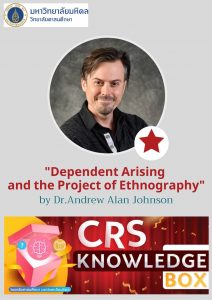“Dependent Arising and the Project of Ethnography”
Ethnography is a project that has at its core uncertainty. Ethnographers – anthropologists, primarily, but also sociologists, religious scholars, and others, approach an academic problem not with questions demanding answers, but in search of questions themselves. The purpose, too, or asking such questions is to reveal yet more; anthropologists’ foundational texts are those that complicate or de-center taken-for-granted truths.
.
In my own work, I ask: what is the relationship between religious ways of being and the coexistence of people and their environments in an era when the environment is rapidly changing (Johnson 2020)? This is especially relevant to animist ways of thought (Arhem and Sprenger 2016). To put it more specifically, if the Mekong River has been a source of magico-religious power in the form of naga, chao don [island spirits], and other beings that mediate between humans and their livelihoods, what happens in the wake of environmental change, when what used to work no longer does (Johnson 2019)?
.
This question seems self-evident. But it is not a question that came from me. Before I conducted field research, I understood the situation of the Mekong in the wake of Chinese and Lao hydropower projects, and knew something would happen, but not what. In presenting the problem of hydropower as a problem of religion, I question other analyses that focus on economics or ecology – those that seek satisfaction in numbers, ones that would arrive with preconceived notions of what is ontologically real and epistemologically logical.
.
Foucault (1966) reminds us that such structures of knowledge are based not on a rational view of reality, but upon a viewpoint that provides a false sense of security in quantification. Here are the categories through which the world is meaningful, empirical research tells us, now let us fill out these categories with data. But one does not need to go all the way to Foucault to understand that perceptions on the world are dependent. Nagarjuna, a Buddhist scholar in India, tells us this already in the second century AD.
.
For Nagarjuna, all phenomena are dependent (Garfield 1995). This means that nothing exists in itself; rather, phenomena arise out of other phenomena, which are, in turn, dependent. The modernist quest for essences is doomed to fail. But this is not a nihilist renunciation of knowledge. Rather, this is a constant quest for something that eternally slips out of grasp.
.
Dependent arising is crucial for ethnography, as it is a discipline devoted to undermining taken-for-granted notions of truth. The data that ethnographers collect is particular to a certain person in a certain time and space. We may tout fluency in a language or familiarity with our interlocutors as badges of “access.” But what do we access? Others are always in the end inaccessible – indeed, our own minds, motivations, and reactions are themselves mysteries in some sense (Bubandt 2019). But, just as with Nagarjuna, the idea that there is no fundamental object of study does not stop inquiry. We will never define culture; it is always being made (and, indeed, “culture” itself is an artificial category). Instead, the insight that ways of knowing are contingent becomes a revelation that we bring home, that destabilizes the everyday in our own lives, reminding that we, too, are dependent.
.
Works Cited
Århem, K. (2016). Southeast Asian Animism in Context. In K. Århem, G. Sprenger (Eds.), Animism in Southeast Asia (pp. 3-30). Routledge.
.
Foucault, Michel. 1966. Les Mots et les Choses. Editions Gallimard. ISBN 02-07-022484-8
.
Garfield, Jay. 1995. The Fundamental Wisdom of the Middle Way: Nagarjuna’s Mūlamadhyamakakārikā. Oxford: Oxford University Press.
.
Johnson, Andrew Alan. 2020. Mekong Dreaming: Life and Death Along a Changing River. Duke University Press. 2020. ISBN: 978-1-4780-1082-1


